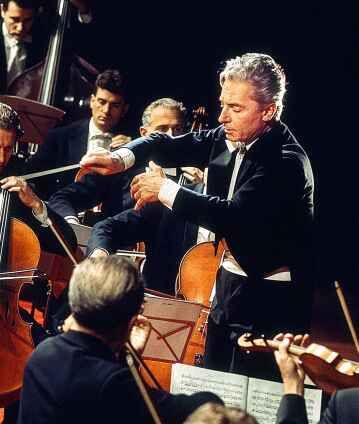Karajan conducts Beethoven’s Sixth Symphony

The emotional and real storms in Beethoven’s Pastoral are vividly expressed in this rousing performance from 1967 with the Berliner Philharmoniker and Herbert von Karajan. These are intensified all the more by the award-winning avant-garde director Hugo Niebeling’s innovate and often expressionistic film concept: an experiment whose aesthetic boldness impresses to this day.
During the first 24 years of Herbert von Karajan’s professional career, he conducted the Pastoral Symphony on only two occasions: in Aachen in 1936 and Berlin in 1944. However, his first recording of this work, made in London in 1953, quickly established itself – despite a number of rival recordings by leading conductors such as Beecham, De Sabata, Furtwängler, Erich Kleiber, Klemperer and Toscanini. As the prestigious Record Guide put it: “Like all Karajan’s Beethoven readings, his account of the Pastoral is suffused with lyricism; orchestral tone and phrasing are tenderly nursed. The performance as a whole has a great sweep, and Karajan ranges through a bigger landscape than usual. It is a modern recreation of the Pastoral, yet one faithful to the spirit of Beethoven’s score.”
After his election as artistic director of the Berliner Philharmoniker in 1955, Karajan programmed the Pastoral rather more regularly. During concert cycles of the Nine, he generally paired it with the Fifth. At other times he was inclined to set it alongside early 20th-century masterpieces – music by composers such as Debussy, Sibelius and even on occasion Stravinsky – whose orchestral tone-painting and evocations of the natural world “matched” those of the Pastoral as Karajan heard and imagined it.
This fine 1967 performance of the symphony was recorded in Berlin’s Jesus-Christus-Kirche in Dahlem. The filming by award-winning modernist director Hugo Niebeling took place in Artur Brauner’s CCC studios in Berlin. An essay in expressionist film-making that deployed “black” light alongside abstract and even occasionally distorted images, the film was widely criticised for being closer to the world of Schoenberg’s Transfigured Night than that of Beethoven’s Pastoral. Karajan had reservations about the experiment but later engaged Niebeling to direct what would be landmark filmings of the Third and Seventh Symphonies.
© 1968 Unitel
Artists
Our recommendations
- Karajan conducts Ravel and Debussy
- Karajan conducts Beethoven’s Ninth Symphony
- Concert, conversation and master class: Karajan conducts Beethoven’s Symphony No. 5
- Karajan conducts Beethoven’s Ninth Symphony at the 1977 New Year’s Eve Concert
- Karajan conducts Beethoven, Weber, Rossini and Wagner
- Performance and conversation: Karajan conducts Dvořák’s Symphony No. 9